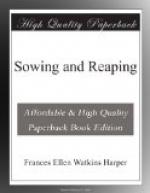“I think it would, if I let conscience interfere constantly, with every business transaction I undertook. Now last week you lost $500 fair and square, because you would not foreclose that mortgage on Smith’s property. I told you that ‘business is business,’ and that while I pitied the poor man, I would not have risked my money that way, but you said that conscience would not let you; that while other creditors were gathering like hungry vultures around the poor man, you would not join with them, and that you did not believe in striking a man when he is down. Now Paul, as a business man, if you want to succeed, you have got to look at business in a practical, common sense way. Smith is dead, and where is your money now?”
“Apparently lost; but the time may come when I shall feel that it was one of the best investments I ever made. Stranger things than that have happened. I confess that I felt the loss and it has somewhat cramped my business. Yet if it was to do over again, I don’t think that I would act differently, and when I believe that Smith’s death was hurried on by anxiety and business troubles, while I regret the loss of my money, I am thankful that I did not press my claim.”
“Sour grapes, but you are right to put the best face on matters.”
“No, if it were to do over again, I never would push a struggling man to the wall when he was making a desperate fight for his wife and little ones.”
“Well! Paul, we are both young men just commencing life, and my motto is to look out for Number 1, and you—”
“Oh! I believe in lending a helping hand.”
“So do I, when I can make every corner out to my advantage. I believe in every man looking out for himself.”
You will see by the dialogue, that the characters I here introduce are the antipodes of each other. They had both been pupils in the same school, and in after life, being engaged as grocers, they frequently met and renewed their acquaintance. They were both established in business, having passed the threshold of that important event, “Setting out in life.” As far as their outward life was concerned, they were acquaintances; but to each other’s inner life they were strangers. John Anderson has a fine robust constitution, good intellectual abilities, and superior business faculties. He is eager, keen and alert, and if there is one article of faith that moulds and colors all his life more than anything else, it is a firm and unfaltering belief in the “main chance.” He has made up his mind to be rich, and his highest ideal of existence may be expressed in four words—getting on in life. To this object, he is ready to sacrifice time, talent, energy and every faculty, which he possesses. Nay, he will go farther; he will spend honor, conscience and manhood, in an eager search for gold. He will change his heart into a ledger on which he will write tare and tret, loss and gain, exchange




